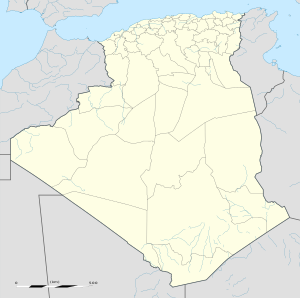Aïn Beïda, Oum El Bouaghi
|
Aïn Beïda عين البيضاء |
|
|---|---|
| Commune and city | |

Street view of Aïn Beïda
|
|
 |
|
| Coordinates: 35°47′N 7°23′E / 35.783°N 7.383°E | |
| Country |
|
| Province | Oum El Bouaghi Province |
| District | Aïn Beïda District |
| Area | |
| • Total | 53.73 km2 (20.75 sq mi) |
| Elevation | 1,020 m (3,350 ft) |
| Population (2008 census) | |
| • Total | 116,064 |
| • Density | 2,200/km2 (5,600/sq mi) |
| Time zone | CET (UTC+1) |
| Postal code | 04201 |
Aïn Beïda is a city and municipality (baladiyah) located in Oum El Bouaghi Province, Algeria, south east of Constantine and north of Khenchla, inhabited by Chaouis. In 1998 its population was 88,300.
Aïn is Arabic and means spring, while Beïda means white. Thus, Aïn Beïda literally means "White spring". The "whiteness" refers to the purity of the water that springs from the said spring.
The town center still features a garden that houses Roman ruins, which indicates that the town has a long and rich history. Former name in Roman Era is "Marcimani". The city was a strategic town in Roman Era with it is middle place between Theveste Cirta Baghai. In Turkish days, there was the strongest Emirates in East of Algeria based in Ain Beida as capital. That Emirates has a strong army worth of 25000 men. After French invasion Haractas confronted the invasion bravely and lost in the battle of Oued Meskiana due to unbalance between two armies 60000 against 30000 of Harcatis. After that France bring a Kaid from the outside of the Harkatis like a traitor and give him the lands. Many "Baidis" have been in World war 1 and 2 and also in first Arabic Israeili war of 1948 After the beginning of the Algerian War, the city was one of the most frequent Cities by Jihad and offers thousands of life to the land and religion and for the liberation of Algeria. Among those we mention; Saidi Djemouii (Black tiger of palestro), Delphi Ibrahim, Colonel Hadj Ali Hamdi, Soltani Mohamed Salah and many others who offered their life for the Algerian case. After independence, the city has grown to be a prominent area of trading, selling used cars, production of electricity, distribution of gas. From the Olemas Muslimin we cite: Lakhdar boukeffa, Zinai Hadj belkacem; Zemouchi, and after them many olemas like Cheikh Ghoulam and Ghazali.
...
Wikipedia

